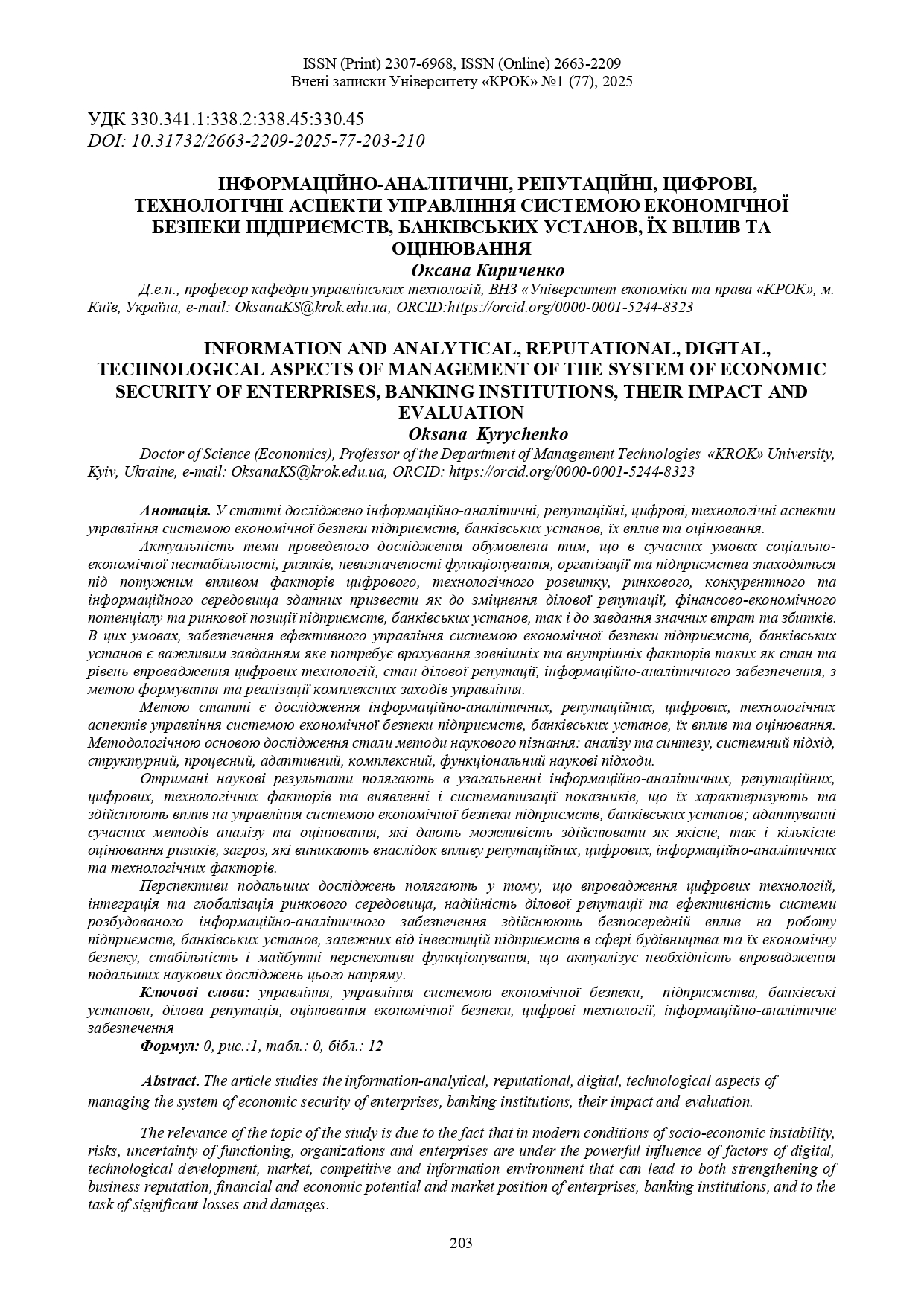ІНФОРМАЦІЙНО-АНАЛІТИЧНІ, РЕПУТАЦІЙНІ, ЦИФРОВІ, ТЕХНОЛОГІЧНІ АСПЕКТИ УПРАВЛІННЯ СИСТЕМОЮ ЕКОНОМІЧНОЇ БЕЗПЕКИ ПІДПРИЄМСТВ, БАНКІВСЬКИХ УСТАНОВ, ЇХ ВПЛИВ ТА ОЦІНЮВАННЯ
DOI:
https://doi.org/10.31732/2663-2209-2025-77-203-210Ключові слова:
управління, управління системою економічної безпеки, підприємства, банківські установи, ділова репутація, оцінювання економічної безпеки, цифрові технології, інформаційно-аналітичне забезпеченняАнотація
У статті досліджено інформаційно-аналітичні, репутаційні, цифрові, технологічні аспекти управління системою економічної безпеки підприємств, банківських установ, їх вплив та оцінювання.
Актуальність теми проведеного дослідження обумовлена тим, що в сучасних умовах соціально-економічної нестабільності, ризиків, невизначеності функціонування, організації та підприємства знаходяться під потужним впливом факторів цифрового, технологічного розвитку, ринкового, конкурентного та інформаційного середовища здатних призвести як до зміцнення ділової репутації, фінансово-економічного потенціалу та ринкової позиції підприємств, банківських установ, так і до завдання значних втрат та збитків. В цих умовах, забезпечення ефективного управління системою економічної безпеки підприємств, банківських установ є важливим завданням яке потребує врахування зовнішніх та внутрішніх факторів таких як стан та рівень впровадження цифрових технологій, стан ділової репутації, інформаційно-аналітичного забезпечення, з метою формування та реалізації комплексних заходів управління.
Метою статті є дослідження інформаційно-аналітичних, репутаційних, цифрових, технологічних аспектів управління системою економічної безпеки підприємств, банківських установ, їх вплив та оцінювання. Методологічною основою дослідження стали методи наукового пізнання: аналізу та синтезу, системний підхід, структурний, процесний, адаптивний, комплексний, функціональний наукові підходи.
Отримані наукові результати полягають в узагальненні інформаційно-аналітичних, репутаційних, цифрових, технологічних факторів та виявленні і систематизації показників, що їх характеризують та здійснюють вплив на управління системою економічної безпеки підприємств, банківських установ; адаптуванні сучасних методів аналізу та оцінювання, які дають можливість здійснювати як якісне, так і кількісне оцінювання ризиків, загроз, які виникають внаслідок впливу репутаційних, цифрових, інформаційно-аналітичних та технологічних факторів.
Перспективи подальших досліджень полягають у тому, що впровадження цифрових технологій, інтеграція та глобалізація ринкового середовища, надійність ділової репутації та ефективність системи розбудованого інформаційно-аналітичного забезпечення здійснюють безпосередній вплив на роботу підприємств, банківських установ, залежних від інвестицій підприємств в сфері будівництва та їх економічну безпеку, стабільність і майбутні перспективи функціонування, що актуалізує необхідність впровадження подальших наукових досліджень цього напряму.
Завантаження
Посилання
Коваленко, В. & Сергєєва, О. (2020). Теоретичні аспекти впливу ділової репутації на забезпечення фінансово стійкого розвитку банків. Сучасні реалії фінансово-економічного розвитку регіонів, галузей, підприємств, бізнесу: монографія. Дніпро: Пороги. Т.1. С. 281–297.
Міщенко, В., & Науменкова, С. (2016). Банківська система України: проблеми становлення та розвитку. Фінанси України. № 5. С. 7-33.
Коваленко, В. (2021). Ділова репутація та її вплив на фінансову стійкість банків. Академічний огляд. №1(54). С.23-35.
Телешун С., Ситник С., Рейтерович І., Титаренко О., Вировий С., Телешун С. (2011). К. : НАДУ, 2011. 310 с.
Захаров, О. (2009). Інформація в управлінні системою економічної безпеки підприємства. Вчені записки Університету КРОК. №19. С.177-186
Козловська, О. (2013). Пріоритетні напрями державного регулювання розвитку інформаційного ринку в Україні. Наукові розвідки з державного та муніципального управління. №. 1. С. 184-198.
Зачосова, Н. & Горячківська, І. (2016). Інформаційно-аналітичне забезпечення оцінювання функціонування системи економічної безпеки підприємств та фінансових установ. Глобальні та національні проблеми економіки. № 10. С. 339-344.
Кириченко, О. (2021). Інвестиційно-інноваційне забезпечення промисловості України в умовах Четвертої промислової революції: монографія. К.: Університет КРОК. 368 c. https://dspace.krok.edu.ua/items/5559b91b-394d-45bb-b57b-1b5352fc1d80
Кравченко, О., Гаврилюк, О., Челомбітько, О., & Бойко, С. (2024). Управління економічною безпекою підприємств в умовах цифрової економіки. Адаптивне управління: теорія і практика. Серія Економіка, №19(38). С. https://doi.org/10.33296/2707-0654-19(38)-12
Кульчицький, І. (2024). Цифрова економіка та економічна безпека підприємства: стратегії управління. Актуальні питання економічних наук. №6. С. 22-28. https://doi.org/10.5281/zenodo.14575016
Samoilenko Yu., Britchenko I., Levchenko Ia., Losonczi P., Bilichenko O., Bodnar O. (2022). Economic Security of the Enterprise Within the Conditions of Digital Transformation. Economic Affairs. Vol. 67. No. 04. Р. 619–629.
Дергалюк, Б. (2023). Вплив цифрової трансформації та забезпечення економічної безпеки підприємства. Економічний вісник НТУУ Київський політехнічний інститут. № 26. С. 65-68
Проскура, В., Черничко, Т., & Верецький, Д. (2024). Сучасні підходи до визначення рівня економічної безпеки підприємства в умовах цифровізації. Цифрова економіка та економічна безпека. № 4 (13). С. 61-67.

Downloads
Опубліковано
Як цитувати
Номер
Розділ
Ліцензія

Ця робота ліцензується відповідно до Creative Commons Attribution-NonCommercial 4.0 International License.

